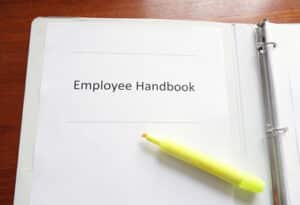The employee handbook is no longer viewed as just a communication tool for employers. It’s now regarded as a protection strategy as well. The handbook can be your recipe for onboarding success and your legal knight in shining armor, regardless of your business size.

Consider the following basic information that’s typically given to new hires during onboarding:
- Company mission, values and culture.
- Employment policies, including termination of employment.
- Workplace conduct, such as standards of conduct and disciplinary actions.
- Compensation, including pay raises.
- Employee rewards program.
- Performance review standards.
- Mandatory and voluntary benefits.
- Time-off policies.
- Technology policy, such as computer usage and social media guidelines.
- Office security, such as emergency action plan.
- General policies and procedures, such as attendance, timekeeping, overtime, health and safety, personnel records, and inclement weather.
The employee handbook enables you to assemble this data into one convenient package, thereby streamlining the onboarding process. A well-designed handbook also helps new hires understand their responsibilities, lowering the odds of them jumping ship because of unclear expectations.
Your legal knight in shining armor
Employment-related lawsuits are consistently frequent in America, and the employee handbook can be a defensive bulwark for employers.
The Equal Employment Opportunity Commission (EEOC) reports that 72,675 charges were filed by the agency for discrimination relating to sex, color, age, disability, retaliation and equal pay in 2019, the most recent year for which the agency has statistics.
By including EEO and other employment-related topics in the handbook, you can tangibly prove in legal disputes that you informed your employees of their rights and responsibilities.
HR best practices dictate having employees sign a statement acknowledging receipt of the handbook. But what if they refuse to sign? According to the Society for Human Resource Management, you cannot force employees to sign for the handbook. But you can:
- Have the employee state in writing his or her refusal to sign.
- Have a representative from your company state in writing that the employee refused to sign for the handbook. Then, have the representative and a witness sign and date the statement.
This way, if a legal battle arises, you can show that the employee was aware of the handbook but refused to sign the acknowledgement form.
Why business size does not matter
If you have only a few employees, you might think that you don’t need to develop an employee handbook. But when you consider that the handbook works as both a communication and a compliance tool, it’s easy to see that the size of your business is irrelevant.
Even if you have only one employee, that employee still needs to know the fundamentals of your company and his or her employment rights and responsibilities. The simplest way to funnel this information is via the employee handbook. Once your business starts growing, you’ll likely need to hire more employees, at which point the need for an employee handbook will become even more pressing. So it makes sense to view the employee handbook as a cornerstone of your business right from the start.
How BlueStone Services Can Help
If you don’t have an employee handbook, or need to update your current one, BlueStone Services is here to help. Work with us to take care of ongoing, day-to-day human resources operations, including employee handbooks. Our team will provide ongoing support for your organization’s HR responsibilities including recruitment coordination, onboarding, HRIS and recordkeeping, HR compliance, talent management, benefits administration, and off-boarding. Contact us today to get started!



